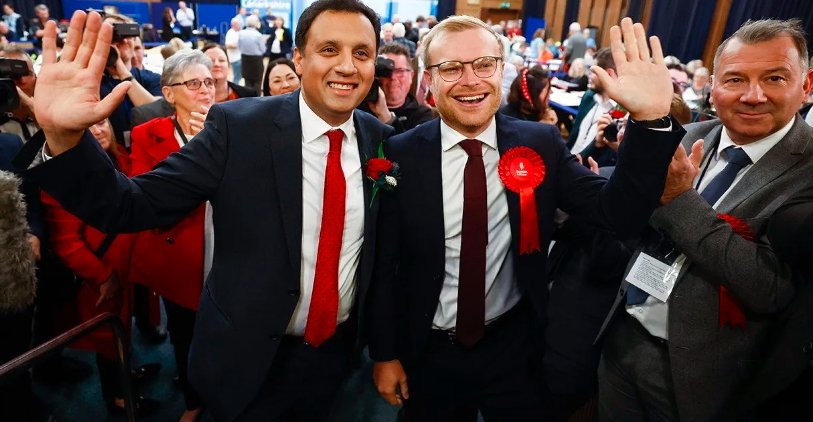Anas Sarwar’s party seizes central belt strongholds as SNP loses 39 seats in one night—shattering a decade of dominance.
In one of the most dramatic political realignments in Scottish electoral history, the Scottish Labour Party stormed to victory across the central belt, toppling the SNP from nearly every major urban seat and effectively ending the party’s grip on Westminster representation.
The SNP, which once held 56 of Scotland’s 59 Westminster constituencies, suffered a catastrophic collapse—surrendering 39 seats in a single night, its worst-ever electoral performance.
“A complete collapse”: Labour dominates Scotland again
The result was as symbolic as it was seismic. Glasgow, once considered the SNP’s impenetrable citadel, turned red. Edinburgh, too, slipped out of the nationalists’ grasp. The SNP’s fall was so steep that some of its leading MPs lost what had been seen as safe seats.
Scottish Labour leader Anas Sarwar, speaking early Friday morning, said he was “absolutely delighted” with the results.
“To the people of Scotland: thank you for putting your faith and trust in the Scottish Labour Party,” he said. “I understand your desire for change. There will be a huge sigh of relief that we’ve finally ended 14 years of total chaos and failure.”
Sarwar’s words echoed those of UK Labour leader Keir Starmer, whose path to a Downing Street majority was paved by Scotland’s shift. The collapse of the SNP in Scotland effectively cleared the way for Labour to retake Westminster.

Urban Scotland turns red again
Here’s how the numbers broke down across Scotland’s key cities:
| Region | Labour Seats Gained | SNP Seats Lost | Former SNP MP Casualties |
|---|---|---|---|
| Glasgow | 7 | 7 | Alison Thewliss, David Linden |
| Edinburgh | 4 | 4 | Tommy Sheppard, Deidre Brock |
| Central Belt | 10+ | 10+ | Numerous previously safe SNP seats |
| Highlands & Islands | 0–1 | 0–1 | Mixed results |
This was not just a loss of seats. It was a collapse of credibility. With the SNP routed in nearly every urban centre, and Labour surging across working-class constituencies it once dominated decades ago, the independence movement was left reeling.
Independence dream now in jeopardy
The political consequences for the independence campaign are already being felt. The SNP’s pitch for a second independence referendum was, in part, based on Westminster representation. That argument has now been decimated.
SNP leader John Swinney, who took over after Humza Yousaf’s resignation, admitted the results were “bitterly disappointing” but stopped short of calling it a repudiation of independence.
“We must reflect, deeply and urgently,” Swinney said. “This result was not what we hoped, and we must now listen—truly listen—to what the people of Scotland have told us.”
But for many inside and outside the party, the message was loud and clear: Scottish voters have shifted from grievance to governance. And that shift doesn’t favour the SNP’s current strategy.
Why did the SNP collapse?
Multiple factors have been blamed for the SNP’s meltdown:
-
Leadership turmoil: Humza Yousaf’s brief and tumultuous tenure damaged the party’s image. Swinney’s return came too late to reset the narrative.
-
Police investigation: The ongoing criminal investigation into SNP finances, including the high-profile arrests of Nicola Sturgeon and Peter Murrell, cast a long shadow over the campaign.
-
Public service chaos: Mounting dissatisfaction with the SNP’s domestic record—on health, education, transport, and drug deaths—fed voter anger.
-
Cost of living fatigue: Labour’s message of “change” resonated with voters exhausted by years of constitutional wrangling and rising bills.
Sarwar’s moment—but is it sustainable?
Anas Sarwar, long seen as a decent but untested figure, now stands as Scotland’s most powerful political leader at Westminster. Yet the scale of Labour’s win raises its own questions.
Can Labour maintain its support in Scotland without reigniting independence debates? Can Sarwar and Starmer rebuild trust in a country that has largely rejected Westminster rule for over a decade?
Political analyst James Mitchell of Edinburgh University cautioned against premature celebration.
“This was a rejection of the SNP more than an embrace of Labour. The real test will be what Labour does with power—both in London and in Glasgow.”
The SNP faces an existential crisis
With Westminster representation slashed and its independence roadmap in ruins, the SNP now enters uncharted territory. Calls are growing for a leadership overhaul and a full strategic rethink.
The question haunting party insiders now is simple: what is the SNP for, if not independence?


















